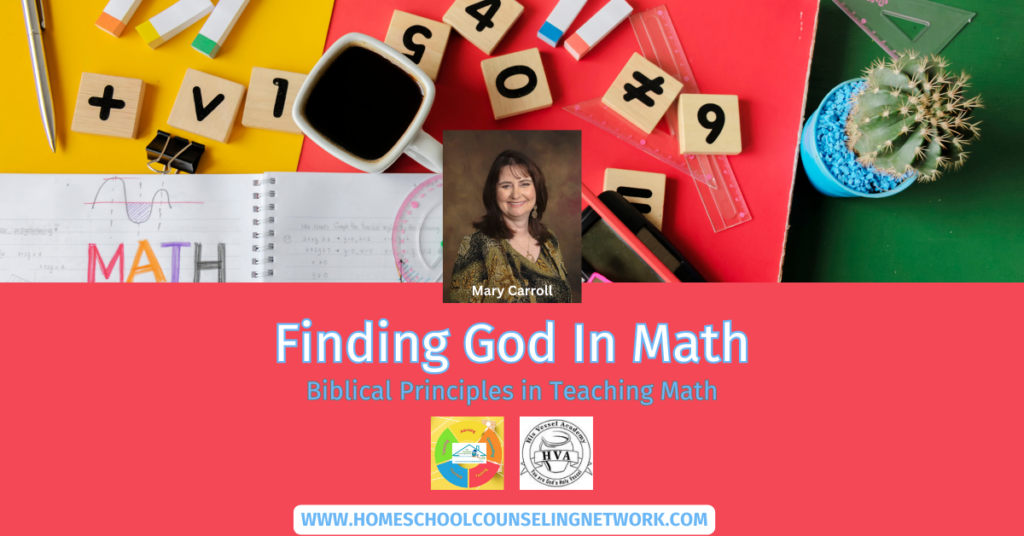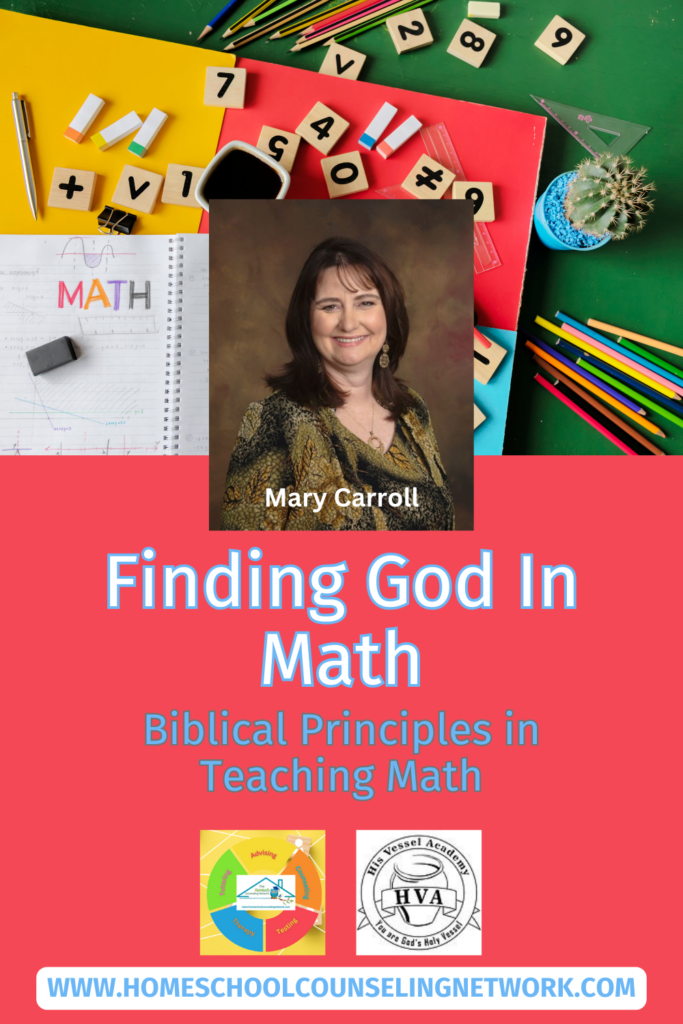Guest Blogger Mary Carroll of His Vessel Academy Teaches Homeschoolers How To Find God In Math

Can you find God in math?
Over the decades, our culture has inadequately investigated this question. Many people are afraid of math, others find what they learned in school to be worthless, and still others think the answer is yes, but they are unsure of how to implement it in their math curriculum.
God created math. His Bible is full of word problems. From Noah, who built the ark based on God’s directions (not a blueprint), to King Solomon’s temple, you can teach your child how math relates to the Bible using basic math and Biblical principles.
Math In God’s Word
How often math is mentioned in the Bible?
A recent Google search turned up less than 150 math verses. But if you search for money and the Bible, over 2000 scriptures are listed. Since finance is listed as a math course, it can be reasoned that there are at least 2000 scriptures about money. This basic fact alone should encourage you to understand how important math is to God. From addition to division, and higher learning concepts, each mathematical operation reveals a facet of our relationship with God, guiding us toward a deeper understanding of His truths.
- Addition: a symbol of growth and abundance in both mathematical equations and faith. When we add numbers, we increase them. When we add to our faith, we ask God to increase it. By adding time spent with God to our lives, we align our priorities with God’s priorities and gain a sense of purpose. By adding activities He wants you to add, you will find peace. If we allow others to dictate what we ought to do, then we “subtract” from our lives.
- Subtraction: It beckons us to eliminate the distractions that hinder our spiritual journey, much like trimming excess from a mathematical equation. By subtracting the unnecessary elements from our lives, we create space for the transformative power of faith to flourish, allowing us to fully devote ourselves to serving and loving Jesus.
- Multiplication: It emerges as a testament to the exponential growth that stems from entrusting our talents to God. Just as He multiplies our offerings, magnifying their impact beyond measure, so too does our faith multiply when rooted in trusting God. Through multiplication, we witness the miraculous expansion of our spiritual gifts, affirming the boundless abundance of God’s grace.
- Division: Often perceived as a symbol of separation, “division” takes on a deeper significance when viewed through the lens of scripture. In the beginning, God divides light from darkness and teaches a timeless lesson about discerning truth in society. As we navigate the divisions of our world, the absolute truth of scripture serves as a beacon of hope, uniting us in our quest to know Jesus.
- Mathematic Concepts: Many students need help understanding the complexities of the Greatest Common Factor and Least Common Multiple. The word greater implies a large number when, in fact, it is a small number. The least implies a small number when, in fact, it is a large number. Putting this in Biblical terms helps the child understand the concepts. In God’s Kingdom, the greatest are small, and the least are large. This simple math truth simplifies the concept and enforces God’s word in your child’s life associated with math.

Math and The Biblical Narrative
The Biblical narrative is full of references to mathematics, highlighting the important connections between faith and numbers. Whether it’s the symbolic significance of numbers in Biblical stories or the practical applications of math in daily life, the intersection of mathematics and spirituality provides a rich tapestry for contemplation.
As we contemplate the fundamental relationship between mathematics and God, let us strive to seamlessly incorporate these fields into our educational pursuits. Like Rebecca’s act of watering camels that reveal mathematical wonders concealed within scripture, we, too, can unearth valuable lessons by practically applying mathematics in Biblical contexts.
By combining math and scripture, we can gain a more comprehensive understanding of both subjects. For example, we can use math to calculate the weight and cost of Nebuchadnezzar’s statue or to uncover the secrets of ancient furnaces. Such integration of knowledge can help us appreciate God’s order that underlies all creation and develop a deeper understanding of the relationship between math and God’s eternal truth. By teaching future generations in this way, we can instill in them a sense of reverence for the inherent beauty and interconnectedness of math.
Summing It All Up
In conclusion, the connection between mathematics and spirituality offers profound insights into God’s nature and His plan for your life.
As we embark on this journey of homeschooling, may we embrace the inherent beauty of mathematical principles, allowing them to illuminate the path to God’s grace and purpose for your life. We find principles and patterns in God’s creation and in His Word.
We live in a world where many different answers exist but very few truths. Unfortunately, our opinions often divide us into your truth versus my truth. In math, 2 + 2 = 4 is an absolute truth. Even if someone doesn’t believe it, their bank statement will prove it. However, let’s say someone truly believes that 2 + 2 = 3. Does that make it true? No, it doesn’t. This is a great example of how to teach your child that, just like in math, the Bible is the only source of real, absolute truth. We’ve been led to believe that everyone has their own truth, and they don’t have to be the same. But that’s not true. There’s only one real, authentic truth, and anything else is a lie.
About The Author
Want To Write For Us?
Learn more about how you can become a guest blogger for The Homeschool Counseling Network here.

Let’s Keep In Touch
Be sure you do not miss a blog post by signing up for our newsletter or joining our Facebook group.
Blessings,
Kimberly Bennett, LPC
Founder/CEO It’s Only Homeschooling
Founder/CEO The Homeschool Counseling Network

This website is not a professional counseling website and nothing here should be construed as professional counseling advice. Although Kimberly Bennett, LPC is a Licensed Professional Counselor, she is not your counselor, and no counselor-client relationship is established unless she has signed an agreement with you. All information provided through this website is for informational and educational purposes only.
